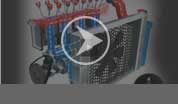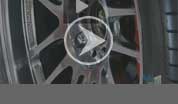Category Archives: Drive Train
Differential Service in Des Moines, IA – What You Need To Know
Scratching your head? Don’t worry, if you don’t know what a differential is – you will in a moment. That fact is that if you drive a car anywhere in Des Moines, IA, you have a differential. Whether your vehicle is front-wheel drive, rear-wheel drive or four-wheel drive, you have a differential. Some Des Moines motorists might even have two or three.
Not surprisingly, a differential’s job is to compensate for differences. Specifically the differences in wheel speed when turning. For instance, imagine taking a corner near your Des Moines, IA home. Your inside wheel has a shorter distance to travel than the outside wheel as you turn the corner. That means that your outside wheel has to turn faster to keep pace with the inside wheel.
The differential allows the wheels to turn at different speeds while still providing power to your vehicle. Without a differential, Des Moines auto owners’ tires would scrub and hop along the pavement during turns like the early cars.
Ever noticed the big bulge in the middle of the rear axle on trucks? That’s the differential. Rear-wheel drive vehicles have a differential in back. Most four-wheel drive trucks and SUVs will also have a similar differential on the front axle. Front-wheel drive vehicles’ differential is called a transaxle because it combines the differential and transmission in one unit. An all-wheel drive vehicle will have a differential or transfer case that adjusts for speed differences between the front and rear drive wheels.
It can seem a little complex to some Altoona motorists – but you can see that all of the engine’s power is routed through your differentials. They’re strong enough to handle the work, but- we’ve said it before – they need to be properly lubricated in order to stay strong. So from time to time, you need to schedule a differential service in Des Moines at Des Moine BDG. The used fluid is drained and replaced with clean fluid. Some auto makers advise certain differentials to have special additives installed.
Get your differential serviced at Des Moine BDG in Des Moines.
Recommendations for the time and mileage interval for servicing your differential can vary greatly by vehicle. A front-wheel drive vehicle’s transaxle will need servicing more frequently than the rear differential on a pick-up truck, so check with your Des Moines, IA Des Moine BDG tech or your manufacturers owner’s manual for recommendations.
How and where you drive in Des Moines will have a vital impact as well. If you drive on dirt roads or through streams around Altoona, IA, you’ll need to service your differential much sooner than if you always stay on IA freeways.
Drive Train – What You Need to Know In Des Moines
One Des Moines automotive service issue that doesn’t get much attention is driveline service. Drivelines don’t get talked about very much around Des Moines, but they’re very important. First let’s define what the driveline is:
Taking a small step back, the power plant is comprised of the engine and transmission. The driveline starts there and includes all of the components that transfer power from the transmission to the wheels.
That’s not really a lot of components, but they handle the full force of the engine. Without the driveline you’re not moving. So we need to take good care of it. The driveline components differ depending on whether your vehicle has front wheel drive, rear wheel drive, all wheel drive or four wheel drive. For purposes of our discussion, we’re going to have to over simplify a bit.
If you are ready to have your drive train looked at, give us a call:
Des Moine BDG
2222 East Douglas Ave
Des Moines, IA 50313
Call Us at 1.800.LET.NAPA
Let’s start with front wheel drive. The point where the transmission stops and the driveline begins is a little blurred with front wheel drive because the transaxle houses both the transmission function and the differential function. The half shafts that send power to each front wheel, come out of the transaxle. The shaft is connected to the wheel by a constant velocity, or CV, joint. The CV joint is protected from dirt and water by an airtight, flexible rubber boot.
So, driveline service would include properly servicing the transaxle and inspecting the CV boot to see if it’s torn or loose. If it is, it needs to be replaced and the CV joint inspected for damage. Repairs may be in order. Besides visual damage to the airtight CV boot, you might hear a clicking noise when turning. Recommended maintenance for the transaxle and CV joints will be spelled out in your owner’s manual or check with your Des Moines service advisor.
On to rear wheel drive. The driveline for a rear wheel drive vehicle starts with the driveshaft – that long tube that connects the transmission with the differential on the rear axle. Some vehicles in Des Moines have a two piece drive shaft. The shafts are connected to the transmission and the differential with big universal joints. You’ve probably heard the term ‘u-joints‘. These joints can wear out, just like the CV joints in front wheel drive vehicles. You may hear some clunking or feel a jolt when shifting into drive or reverse – if you do, get your driveline inspected.
The differential on the rear axle sends power out to each rear wheel through half shafts in the axle. The differential fluid needs to be drained periodically and replaced with clean fluid. When the seal on the end of the axle is damaged or leaks, the axle will need to be serviced. The routine maintenance item here is differential service. Be sure to check your owner’s manual or Des Moines service advisor for intervals.
Now let’s go on to all wheel drive. Remember that the difference between all wheel drive and four wheel drive is that an all wheel drive vehicle is essentially providing power to all of the wheels all of the time. The vehicle may be able to shift more of the power to the front or to the back depending on where you need traction. All wheel drive vehicles are designed to work well on dry pavement. Even some high-end sports cars from makers like Lamborghini and Porsche have all wheel drive.
Some all wheel drive vehicles are designed to work well off-road, but all hard-core rock crawlers are four wheel drive. These guys thrive in mud, sand, rocks and hills – but they don’t work well on dry pavement when they’re in four wheel drive. So they have the option to shift to rear wheel drive only on dry pavement.
Most all-wheel drive vehicles are very similar to front wheel drive when it comes to the front end. They also have a center differential that transfers power to the rear differential. Connecting it all is a shaft from the transaxle to the center differential and another from the center differential to the rear differential. So all of the normal front wheel drive service is required as well as service to the center and rear differentials.
Four wheel drive can be thought of as a rear wheel drive vehicle that can also send power to the front axle. There’s a transfer case in the middle of the vehicle that can be shifted to send power through a drive shaft to a differential on the front axle. So you need differential service for the front and rear differentials and for the transfer case as well.
The bottom line is that the maintenance schedules are in your owner’s manual. Your Des Moines service advisor can answer any questions you’ve got. If this is the first time you’ve heard some of this stuff – it’s time to ask someone at Des Moine BDG if any of it needs to be done now.
Watch our auto tips video from AutoNetTV.
Differential Service At Des Moine BDG
Here at AutoNetTV, we have national viewers, like your neighbors in Des Moines, who write to us with questions or feedback. One common question we’re asked is: “What is a differential and what does it do?” You may have been told by your Des Moine BDG service specialist that your differential needs service, or seen it as an option up on the service menu. Differential service at Des Moine BDG covers a lot of things, so let’s first talk about what a differential does.
As you drive through a turn, your outside wheels and inside wheels turn at different speeds. Kind of like the cars going around a race track – the ones driving in the outside lanes have a greater distance to travel than the cars in the inside lanes. The differential is what allows the outside and inside drive wheels to rotate at slightly different speeds so that the tires don’t hop or skip while taking corners, or lose traction in dirt or snow on Altoona highways. Differentials have gears in them that transfer the power from the drive train to your wheels – which is why they’re often referred to as gear boxes. The gears need to be very strong to do this work, and they need to be properly protected so that they’ll last.
All vehicles in Des Moines have some form of differential. If you have a front-wheel drive car, your differential is sometimes called a transaxle and is located in the front. If you have rear-wheel drive, the differential is in the back of the car. If you have a four-wheel drive vehicle, you will have a differential in the front and the back – and in the middle as well. The center differential adjusts for differences in speed between the front and rear wheels.
Differential fluid lubricates and cools the gears. Over time, the fluid can get dirty from bits of the gears grinding off. The additives that keep the fluid clean and protect the differential break down over time. So your auto maker has scheduled intervals for you to have your differential fluid changed.
Differentials are hard working mechanisms, and, along with the gears in a manual transmission, need to be serviced regularly at Des Moine BDG with high-quality, replacement fluid. Your Altoona service specialist can give you more information as to when your next differential service is recommended. You can also ask if they have a record of when the service was last completed.
As with most service intervals, if you are driving under more severe conditions in the Altoona area, you will want to service your differential more frequently. “Severe service” conditions are defined in most owners’ manuals, and include: frequent starts and stops, short trips, cold IA weather, hot weather and towing. All these factors add to the stress of the vehicle and its parts. Also, off-roading in IA can be especially hard on differentials, especially if you cross streams. Proper service at Des Moine BDG will extend the life of your gears and keep them running more smoothly. If you have never had your differential checked, visit http://desmoinebdg.autovideotipsblog.com/contact-us for more information.







